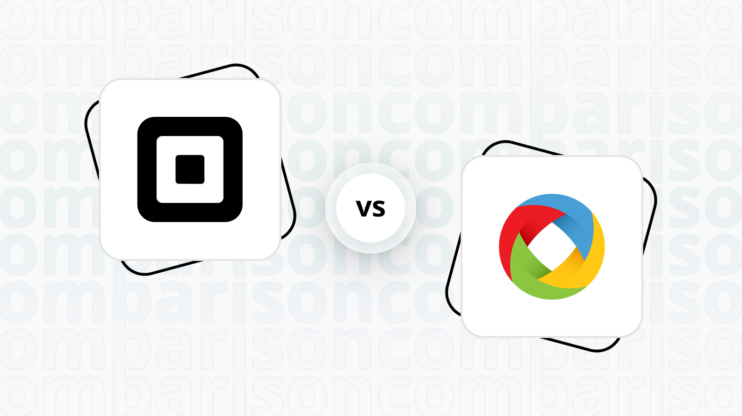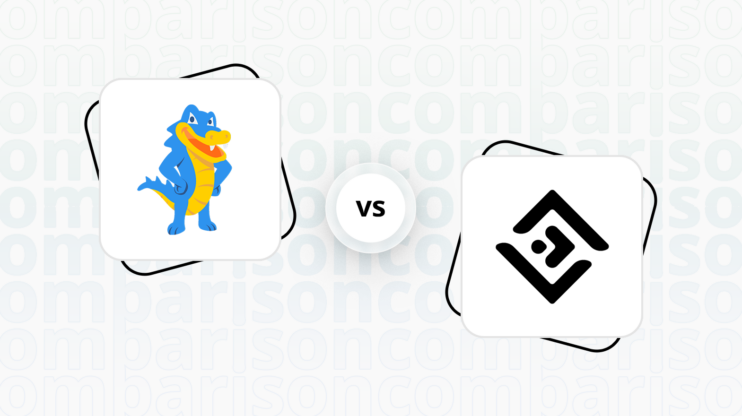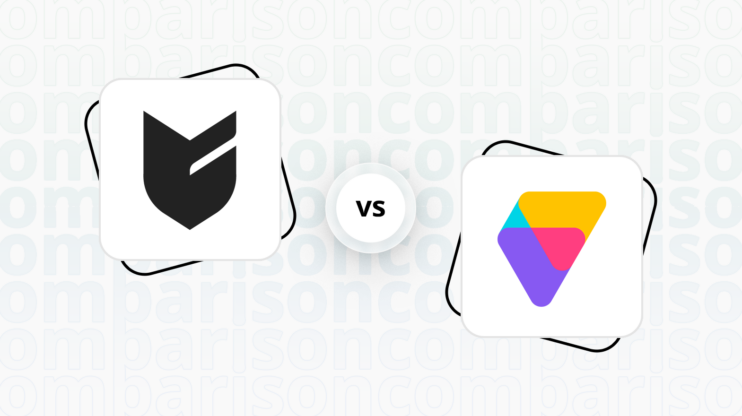Drupal vs Square Online: Final verdict
Drupal and Square Online both offer unique advantages, but they cater to different user needs and expertise levels.
-
Drupal (Overall Grade: 6.4/10)
is a powerful open-source CMS known for its flexibility and extensibility. It is ideal for developers and advanced users who need a highly customizable platform for building complex websites. Drupal excels in design functionalities and templates, offering a vast array of themes and modules. However, it has a steep learning curve and requires technical knowledge to fully leverage its capabilities. When comparing Drupal vs Square Online, Drupal is best suited for users who prioritize customization and scalability. -
Square Online (Overall Grade: 7.2/10)
is a user-friendly website builder tailored for businesses looking to establish an online presence quickly and efficiently. It offers seamless integration with Square’s payment processing and business management tools, making it an excellent choice for retailers, restaurants, and service businesses. Square Online excels in ease of use, ecommerce features, and hosting quality. Considering Drupal vs Square Online, Square Online is ideal for users who need a straightforward, integrated solution for managing their online and offline operations.

|

|
|
|---|---|---|
|
Design functionalities & templates |
7.8 |
7.4 |
|
Ease of use |
5.4 |
8.4 |
|
Ecommerce |
7.5 |
7.3 |
|
Website Editors |
7.5 |
6.6 |
|
Product testing options |
7.1 |
7.8 |
|
Price |
5.7 |
7.5 |
|
Hosting quality |
0 |
7.8 |
|
Website speed optimization |
6.4 |
6.2 |
|
Plugins and integrations |
8.6 |
7.6 |
|
Marketing features |
8.0 |
7.4 |
|
Customer support |
6.7 |
6.7 |
|
Security |
8.3 |
8.5 |
|
AI capabilities |
7.5 |
7.4 |
|
User Management |
9.1 |
5.2 |
Which one is the best for ecommerce: Drupal or Square Online?
 7.5
7.5
 7.3
7.3
Verdict
: Drupal offers extensive customization and flexibility, making it ideal for complex ecommerce needs, while Square Online provides a more integrated and user-friendly solution for small to medium-sized businesses.
-
Drupal
: Known for its flexibility and extensibility, Drupal is a powerful open-source CMS that can be tailored to meet complex ecommerce requirements. With features like customizable workflows, extensive module support, and robust security, Drupal is well-suited for businesses that need a highly customizable and scalable ecommerce solution. However, when comparing Drupal vs Square Online, Drupal may require more technical expertise to set up and manage effectively. -
Square Online
: Designed for ease of use, Square Online offers a comprehensive suite of ecommerce features that are seamlessly integrated with Square’s payment processing and business management tools. This makes it an attractive option for businesses looking to manage their online presence and sales efficiently. While it may not offer the same level of customization as Drupal, Square Online is ideal for small to medium-sized businesses that need a straightforward and reliable ecommerce platform.
Which one is the best for informational and business websites?
 7.5
7.5
 7.4
7.4
Verdict
: When comparing Drupal vs Square Online for informational and business websites, Drupal slightly edges out Square Online due to its flexibility and extensive customization options, although it comes with a steeper learning curve.
-
Drupal
: Drupal is a powerful open-source CMS known for its flexibility and extensibility, making it ideal for complex informational websites. It offers a wide range of modules and themes, allowing for extensive customization. However, its steep learning curve can be challenging for beginners. Drupal scored 7.5 in this category. -
Square Online
: Square Online is a user-friendly website builder tailored for businesses looking to establish an online presence quickly. It offers customizable templates and seamless integration with Square’s suite of tools, making it a convenient choice for businesses transitioning from brick-and-mortar to online operations. While it is easier to use, it may not offer the same level of customization as Drupal. Square Online scored 7.4 in this category.
Drupal vs Square Online: Detailed comparison
Design functionalities & templates
Design FunctionalitiesRepresents how well each platform allows for creative design and customization of websites.Score Components:
- Template Variety (30%): Range and quality of design templates.
- Customization (30%): Flexibility and options for design alterations.
- User Interface (20%): Ease and intuitiveness of the design process.
- Responsiveness (10%): Adaptability to different devices and screen sizes.
- Innovation (10%): Unique design features and tools.
 7.8
7.8
 7.4
7.4
🏆
Winner: Drupal.
If you’re looking for a platform that offers more creative control and a wide array of design features, Drupal is the preferred choice.
Drupal, as a highly flexible and powerful content management system, offers a vast array of templates and designs to cater to virtually any website need. With thousands of themes available, users can choose from minimalist designs, industry-specific layouts, and highly customizable multipurpose themes. These templates are designed to be responsive, ensuring that websites look great on any device. Moreover, the Drupal community continuously contributes new designs and templates, expanding the options for users to keep their websites modern and engaging.
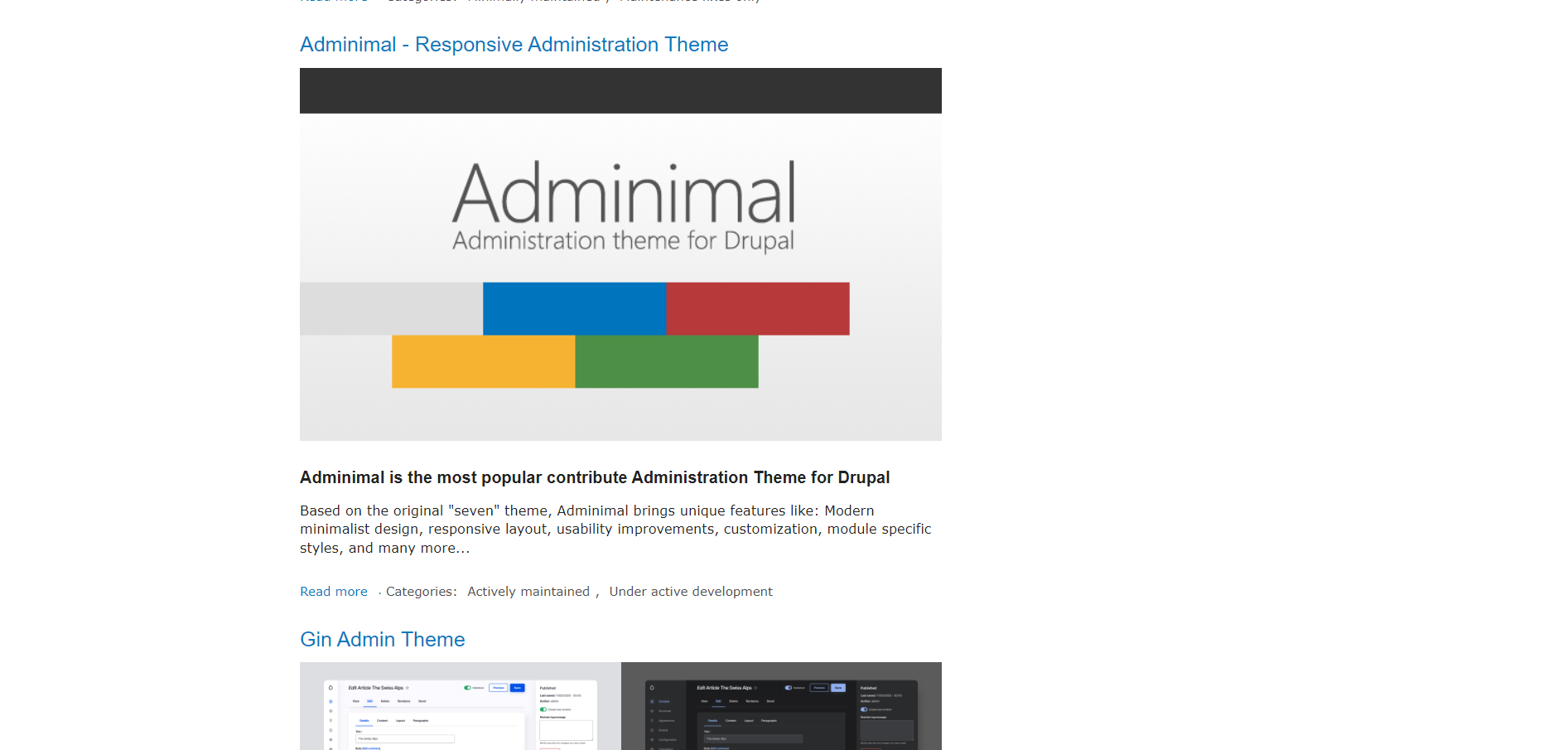
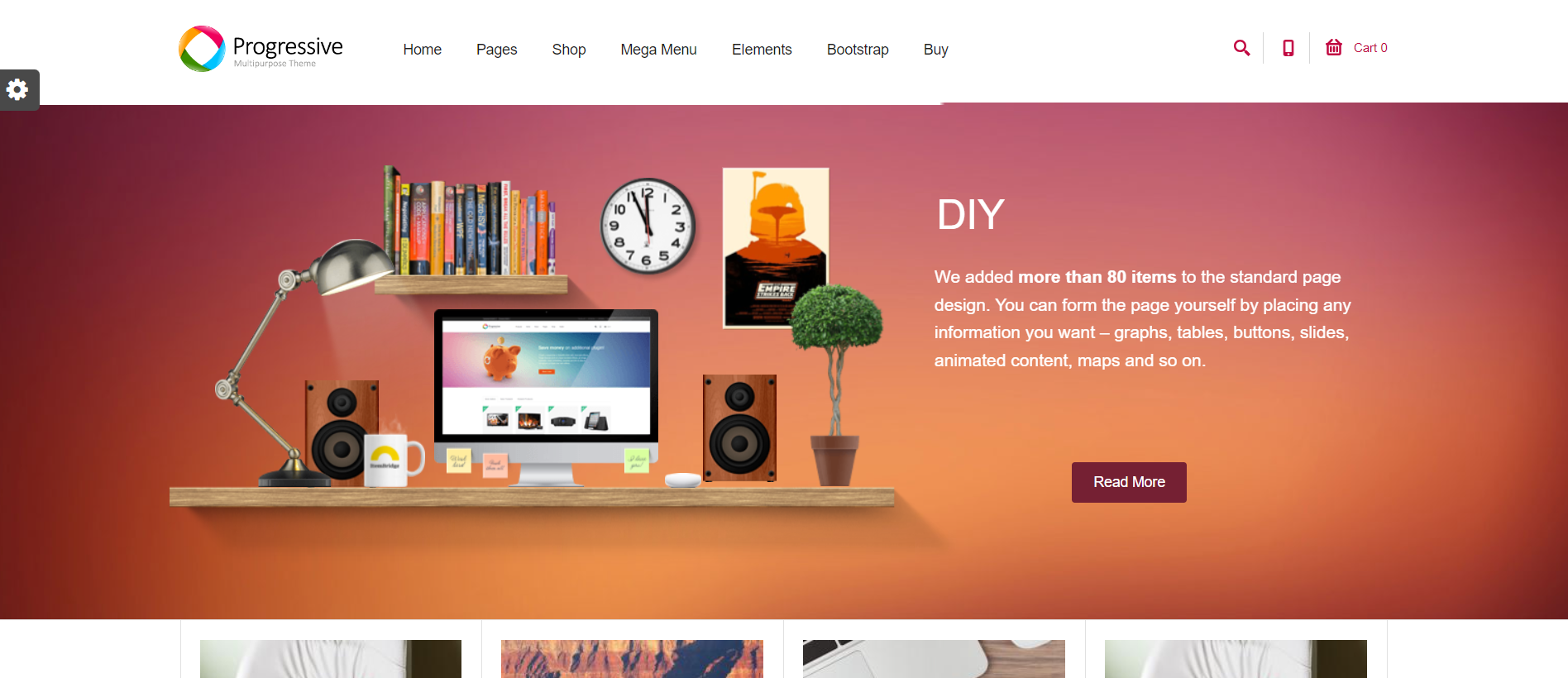
Compared to Drupal, Square Online offers a flexible website builder with a focus on e-commerce, providing a variety of design options through integration with platforms like Weebly. Users can customize their sites extensively, choosing from themes and preset styles to best represent their brand. While the exact number of templates available directly from Square is not specified, the integration with Weebly provides about a hundred themes, including 15 for online stores, emphasizing professional design and mobile responsiveness. This setup caters well to users seeking a blend of ease of use and e-commerce functionality without requiring deep technical knowledge.
Get a head start on website creation with AI
Create a custom website tailored to your business needs 10X faster with 10Web AI Website Builder!
Ease of use
Ease of useReflects the platform’s overall user-friendliness.Score
Components:
- Learning curve (40%): Quickness and ease of getting started.
- Interface design (30%): Simplicity and intuitiveness of layout.
- User guidance (20%): Quality of tutorials and support.
- Flexibility (10%): Adaptability to various user skills.
 5.4
5.4
 8.4
8.4
🏆 Winner: Square Online
. With a score of 8.4, Square Online offers an intuitive and user-friendly website building experience, making it accessible for users without coding skills. On the other hand, Drupal, scoring 5.4, is known for its flexibility and extensibility, but it comes with a steep learning curve that can be challenging for beginners or those not familiar with web development principles.
Learning Resources
🏆 Winner: Drupal
. Despite its complexity, Drupal offers a wealth of learning resources, including extensive official documentation, a vibrant community forum, and a variety of online courses and tutorials. Square Online also provides high-quality resources, but Drupal’s extensive resources make it more accessible for beginners and beneficial for advanced users looking to deepen their expertise.
For ecommerce
EcommerceMeasures the platform’s effectiveness in supporting online business activities.Score Components:
- Ecommerce themes and templates (20%): Variety and design of templates.
- Product management (25%): Ease of managing and organizing products.
- Payment options (25%): Variety and convenience of payment methods.
- Ecommerce features (20%): Features for managing an ecommerce store.
- Integration (10%): Compatibility with external e-commerce tools and services.
 7.5
7.5
 7.3
7.3
When it comes to ecommerce, both Drupal and Square Online offer a range of features to help businesses set up and manage their online stores. Drupal, with its Drupal Commerce module, provides a flexible ecommerce solution that can be seamlessly integrated into its content management system. It offers a wide array of features including product management, shopping cart, payment gateway integration, and customizable workflows. On the other hand, Square Online offers a comprehensive suite of ecommerce features suitable for both online and physical stores, with easy product addition, inventory management, and integrated payment processing primarily through Square.

|

|
|
|---|---|---|
|
Ecommerce themes and templates |
7.8 |
6.8 |
|
Product page customization |
8.3 |
7.6 |
|
Payment processing and commissions |
7.5 |
7.9 |
|
POS capabilities |
5.5 |
9.0 |
|
Payment gateways |
7.7 |
7.5 |
|
Product numbers |
7.0 |
7.0 |
|
Additional ecommerce features |
8.0 |
7.2 |
Drupal ecommerce features:
- Shopping Cart and Checkout Process
- Payment Gateway Integration
- Order Management and Invoicing
- Tax Calculation and VAT Support
- Shipping and Fulfillment
- Promotions and Discounts
- Reporting and Analytics
- Security and Compliance
Square Online ecommerce features:
- Product Listing and Inventory management
- Payment Processing and POS features
- Shipping and Fulfillment
- Marketing features
Ecommerce themes & templates
Drupal offers a wide array of ecommerce themes designed to cater to different types of online stores, from clean and simple designs to more sophisticated and feature-rich options. These themes are built with responsiveness in mind, ensuring that stores function seamlessly across various devices. On the other hand, Square Online offers a range of ecommerce templates designed to meet various business needs, enabling users to customize their sites to match their brand identity. It includes dynamic styling tools, personalized user experiences, and integrated payment solutions.
Product page customization
Drupal offers extensive customization possibilities for product pages through its modular architecture, allowing for detailed content types, flexible displays with Views, and theme customizations. The Drupal Commerce module enriches ecommerce functionalities, enabling tailored product management, checkout flows, and payment systems. In contrast, Square Online allows you to add up to 250 variations per item, like different sizes or versions, through “Selectable Options” in the item details section of your online store. Additionally, “Item Modifiers” allow for further customization by letting customers choose options or input custom text.
Payment processing
Drupal supports a wide range of payment gateways through third-party modules, including popular ones like PayPal, Stripe, and Authorize.Net. While Drupal itself does not charge any commissions or transaction fees, the individual payment gateways integrated with it do have their own fee structures. On the other hand, Square’s website builder supports a variety of payment options including Square Pay, Apple Pay, Cash App Pay, Google Pay, and Afterpay. The platform charges a transaction fee of 2.9% + 30¢ per online transaction for its free plan, with a discounted fee available on the Premium plan.
Website Editors
Website EditorsEvaluates the platforms’ website building and editing capabilities.Score Components:
- Customization tools (40%): Range and power of editing features.
- Editor usability (30%): User experience within the editor.
- Design flexibility (20%): Freedom in layout and design changes.
- Update and maintenance ease (10%): Simplicity of updating and maintaining the site.
 7.5
7.5
 6.6
6.6
🏆
Winner: Drupal
. Drupal, with a score of 7.5, offers a wide range of features tailored for content creation and management. It supports rich text editing, enabling users to format text, insert links, images, and media, as well as create tables and lists with ease. The editor is highly customizable, allowing administrators to configure toolbars and options according to the needs of their site. Furthermore, it integrates seamlessly with Drupal’s content management system, supporting features like automatic content saving, version control, and access control, making it a powerful tool for building and managing diverse web content.
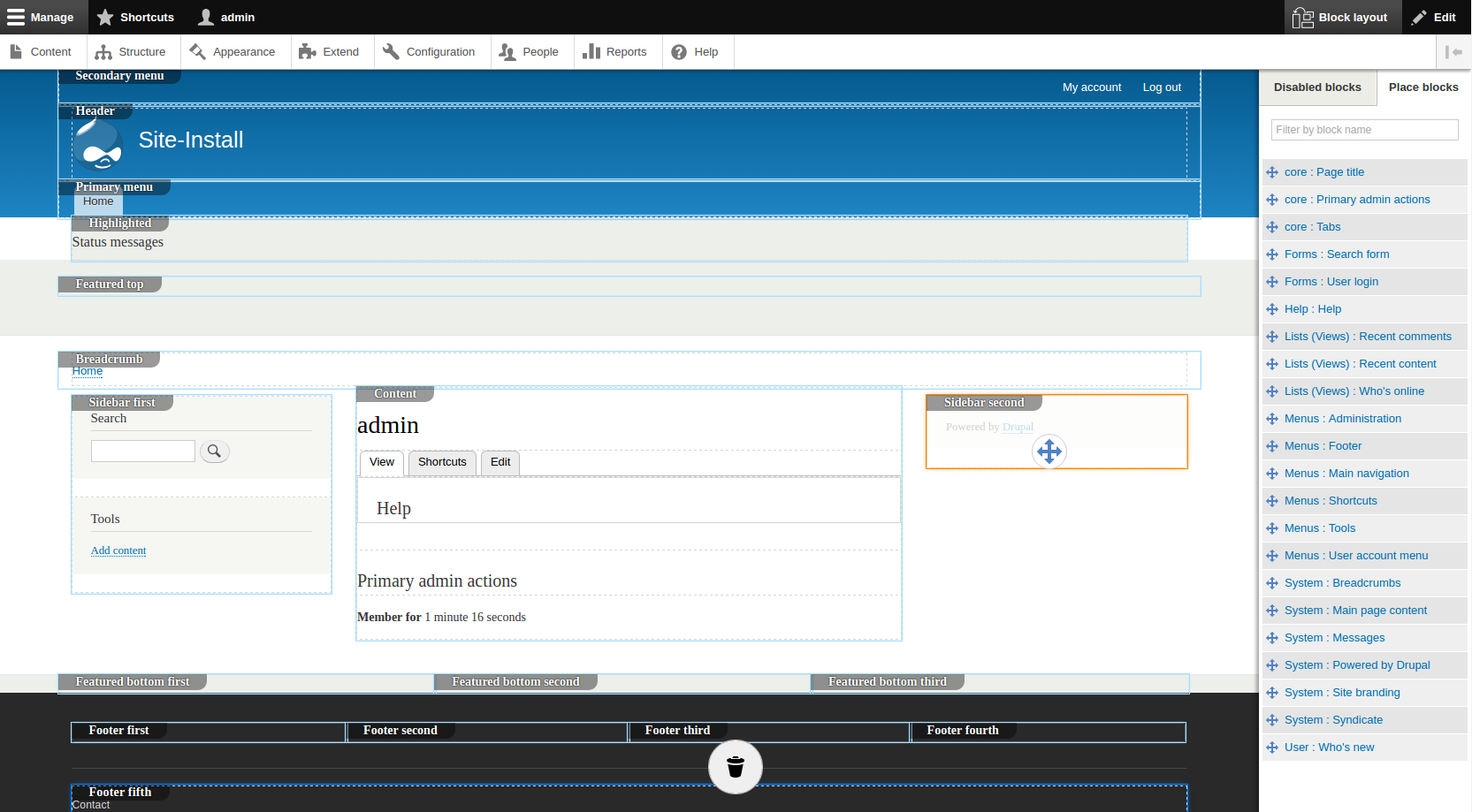
Square Online’s website builder, scoring 6.6, is designed for businesses looking to establish an online presence with ease, focusing on e-commerce functionality. It offers limited customization options, aiming to simplify the design process, yet includes essential e-commerce and marketing tools suitable for a variety of business needs. The platform supports an unlimited number of products and integrates with Square’s payment processing, albeit with limited external payment options. While Square Online is user-friendly and efficient for quickly setting up a website, it may not cater to those seeking extensive design flexibility or advanced e-commerce features.
Mobile editor/app
 0
0
 5.5
5.5
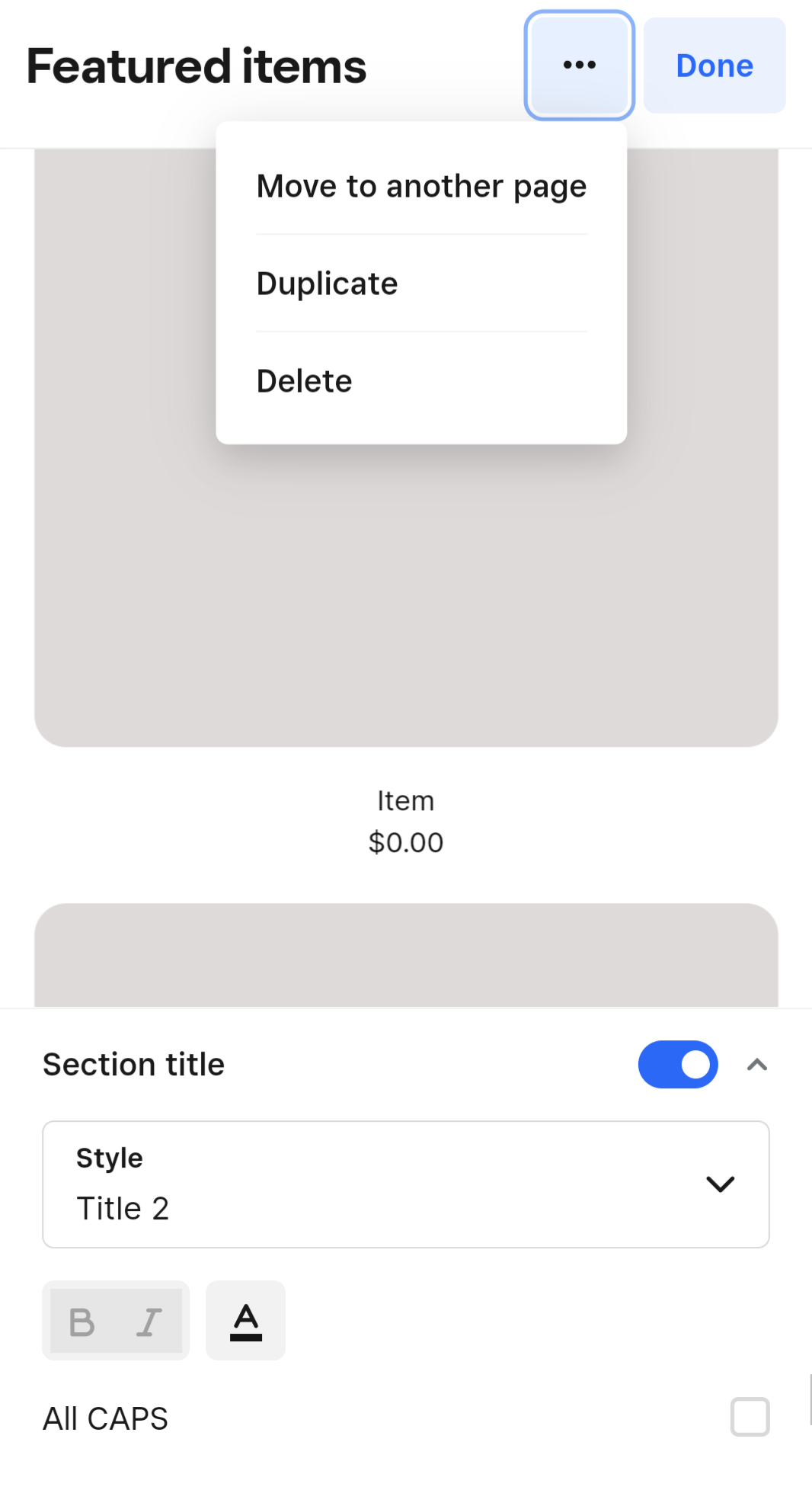
🏆
Winner: Square Online
. Neither Drupal nor Square Online offer a dedicated mobile editor app. However, Square Online allows users to manage and edit their websites using the mobile browser version, albeit with certain limitations. This gives Square Online an edge over Drupal, which does not offer any mobile editing capabilities. Therefore, Square Online scores higher in this category.
Product testing options
Product Testing OptionsAssesses the options for trying out platform features before commitment.Score Components:
- Trial quality (40%): Extent and usefulness of the trial or free version.
- Feature accessibility (30%): How many features are available to test.
- Trial duration (20%): Length of the trial period.
- Ease of transition (10%): Smoothness of moving from trial to paid plans.
 7.1
7.1
 7.8
7.8
Overall Result
:
Square Online wins
. Square Online scores 7.8, slightly higher than Drupal’s 7.1. Square Online offers a 30-day free trial, during which users can test premium features, although billing information is required. Drupal, being an open-source CMS, is free to use, but it does not offer a trial version or the possibility to test premium features.

|

|
|
|---|---|---|
|
Free Plan |
Yes (open-source software) |
Yes |
|
Trial Duration |
No |
30 days |
|
Testing Premium Features |
No |
Yes, during the 30-day free trial |
|
Money Back Guarantee |
Not applicable | No |
Price
PriceLooks at the cost-effectiveness and value for money of each platform.Score Components:
- Plan value (40%): What each pricing tier offers.
- Transparency and clarity (30%): Clearness of pricing structures.
- Flexibility of plans (20%): Range of options to suit different budgets.
- Hidden costs (10%): Additional expenses not included in the plan.
 5.7
5.7
 7.5
7.5
Drupal is a free open-source CMS, but users need to purchase a domain, web hosting, and website builder subscriptions separately. Square Online offers a free plan and two paid plans, including a custom-priced premium plan for larger businesses.

|

|
|
|---|---|---|
|
Free |
No offering at this amount. |
Free ($0/month): For businesses who want to start selling online fast. Online payments with 2.9% + 30¢, basic-site layouts and design controls, tax calculation, unlimited items, SEO tools, blog feature, Facebook ads. |
|
$0+ |
No offering at this amount. |
Plus ($29/month): For businesses looking to drive online growth and streamline operations. Includes all the features of the free plan, plus, free custom domain for a year, professional branding, custom embed code, manage multiple sites, pre-orders, abandoned cart recovery, free shipping and delivery progress bar, product reviews, discounts, website statistics. Value for Price: 7.5 |
location. As a result in rare cases the prices displayed here can differ from the ones you see on their
websites.
Hosting quality
Hosting
qualityExamines the reliability and performance of the hosting solutions.Score Components:
- Uptime (40%): Consistency and reliability of website availability.
- Speed (30%): Loading times and performance.
- Bandwidth and storage (20%): Sufficiency of resources provided.
- Data centers (10%): Quality and distribution of hosting infrastructure.
 0
0
 7.8
7.8
🏆
Winner: Square Online
Square Online offers hosting with unlimited bandwidth, making it a more convenient choice for businesses looking to manage their online presence, sales, and operations efficiently within a single ecosystem. Drupal, being an open-source CMS, does not directly provide hosting services, and the uptime, uptime guarantee, and data centers depend on the hosting provider chosen by the user.

|

|
|
|---|---|---|
|
Do they offer hosting? |
No |
Yes, with unlimited bandwidth |
|
Type of hosting: |
Depends on hosting provider chosen |
Not specified |
|
Uptime: |
Depends on hosting provider chosen |
99.96% |
|
Uptime Guarantee: |
Depends on hosting provider chosen |
No |
|
Data Centers: |
Depends on hosting provider chosen |
Not disclosed |
Website Speed Optimization
Website Speed OptimizationEvaluates optimization of website loading timesScore Components:
- PageSpeed Score (30%): Google’s score indicating performance optimization.
- Loading Time (30%): The average time until a website is fully interactive.
- Mobile Optimization (15%): Optimization effectiveness for mobile devices.
- Resource Optimization (15%): Optimizing images, scripts, and other heavy resources.
- CDN Usage (10%): Use of CDN to enhance speed across geolocations.
 6.4
6.4
 6.2
6.2
🏆 Winner: Drupal
Both Drupal and Square Online have strategies in place for website speed optimization. However, Drupal’s open-source nature allows users to optimize almost all aspects of their website, giving it a slight edge over Square Online.

|

|
|
|---|---|---|
|
Focus |
User-guided optimization |
Built-in optimization features |
|
Performance Tools |
User-selected |
Built-in |
|
Key Strategies |
User-guided optimization |
Lazy Loading, Code Minification, Caching, Image optimization |
|
Load Times |
Varies depending on optimization and website complexity |
Varies depending on optimization and website complexity |
|
Page Speed Scores Range |
Varies depending on optimization and website complexity |
Varies depending on optimization and website complexity |
|
Core Web Vitals Improvement |
Depends on users |
No information provided |
Drupal, being an open-source CMS, allows users to optimize almost all aspects of their website. The load times and PageSpeed scores vary depending on the level of optimization and the complexity of the website. The improvement in Core Web Vitals also depends on the users, as they have the freedom to choose and implement the strategies for speed optimization.
On the other hand, Square Online has built-in optimization features such as Lazy Loading, Code Minification, Caching, and Image optimization. However, like Drupal, the load times and PageSpeed scores vary depending on the level of optimization and the complexity of the website. Square Online does not provide any information on their Core Web Vitals improvements.
Get a head start on website creation with AI
Create a custom website tailored to your business needs 10X faster with 10Web AI Website Builder!
Plugins and integrations
Plugins and integrationsMeasures the range and effectiveness of additional plugins and integrations.Score Components:
- Variety of options (40%): Range of available add-ons.
- Integration smoothness (30%): Ease of integrating plugins into the site.
- Quality of plugins (20%): Functionality and reliability of the options.
- Custom integration capabilities (10%): Support for custom or third-party integrations.
 8.6
8.6
 7.6
7.6
🏆 Winner: Drupal.
With a score of 8.6, Drupal leads the way with its extensive range of over 51,000 modules, showcasing the extensive contributions from its community. These modules are designed to enhance and tailor Drupal applications to specific needs, emphasizing the platform’s flexibility and openness. Predominantly, these modules are freely available and open source, embodying Drupal’s commitment to accessible and communal software development.
Square Online, with a score of 7.6, supports a wide array of app integrations to facilitate various aspects of business operations, including eCommerce, accounting, marketing, and employee management. These integrations span from free options to premium services, with pricing varying widely depending on the app’s features and capabilities. This diversity in app integrations allows businesses to tailor their Square setup to their specific needs, enhancing functionality while managing costs according to their budget.
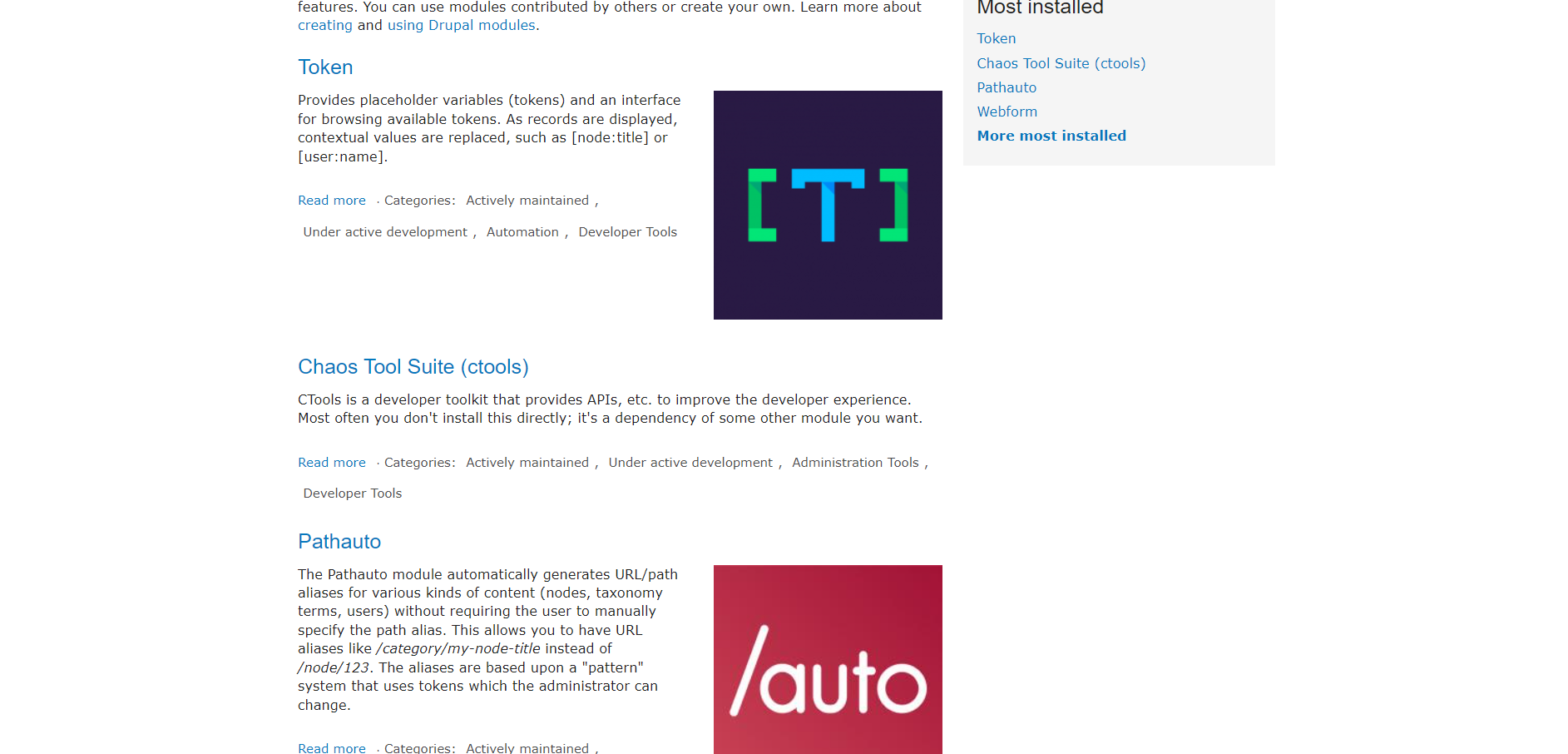
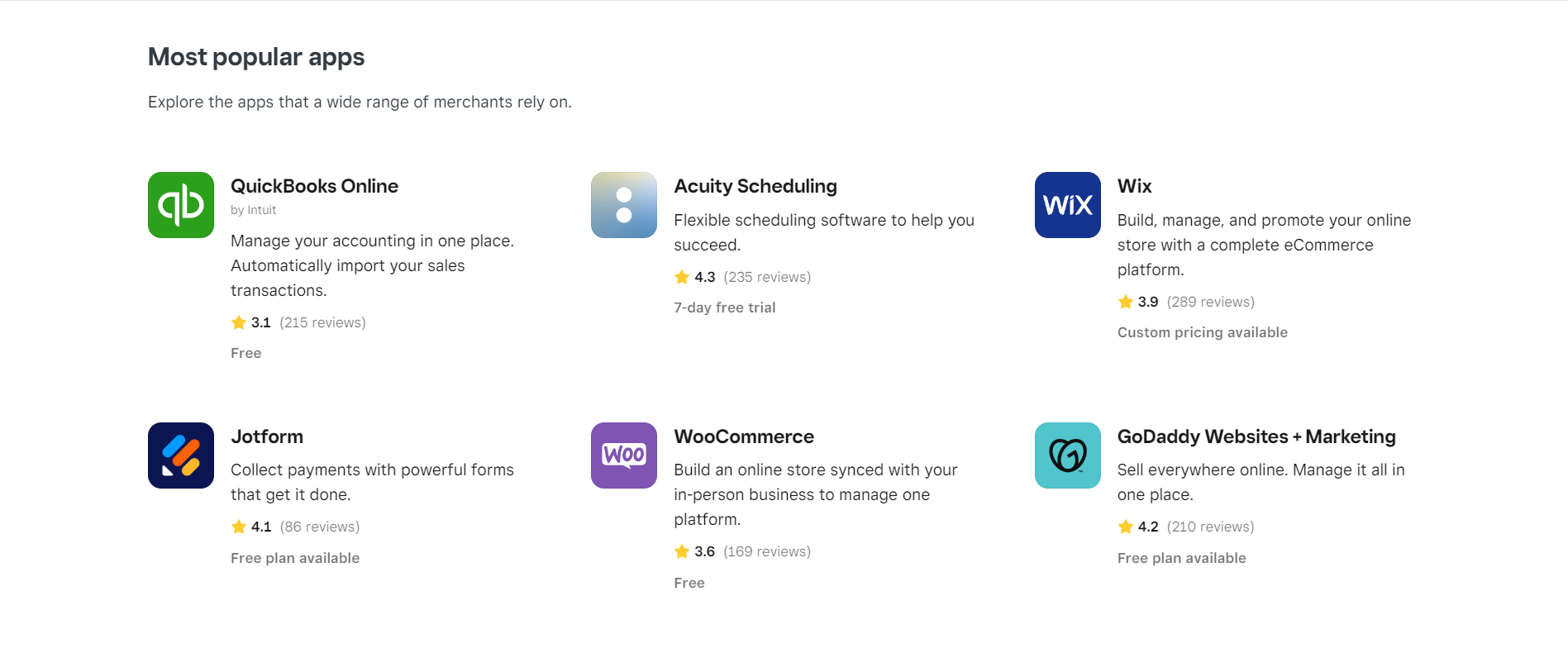
Marketing Features
Design FunctionalitiesRepresents how well each platform allows for creative design and customization of websites.Score Components:
- Template Variety (30%): Range and quality of design templates.
- Customization (30%): Flexibility and options for design alterations.
- User Interface (20%): Ease and intuitiveness of the design process.
- Responsiveness (10%): Adaptability to different devices and screen sizes.
- Innovation (10%): Unique design features and tools.
 8.0
8.0
 7.4
7.4
🏆
Overall Winner: Drupal
. Drupal’s flexibility and extensibility, thanks to its open-source nature and wide range of modules, give it an edge over Square Online. However, Square Online’s integrated approach and focus on seamless transition from physical to online operations make it a strong contender.

|

|
|
|---|---|---|
|
SEO Tools |
Yes, with SEO modules such as Yoast SEO |
Yes |
|
Email Marketing |
Yes, but with third-party extensions, such as MailChimp |
Yes |
|
Blogging |
Yes |
Yes |
|
Social Media Integration |
Yes |
Yes |
|
Analytics and Reporting |
Yes, basic built-in features, and Google Analytics integrations through modules |
Yes |
|
Ads and Promotions |
Yes, but with third-party extensions |
Yes |
Customer Support
Customer supportEvaluates the quality and availability of support options.Score Components:
- Response time (40%): Speed of support responses.
- Support quality (30%): Effectiveness and helpfulness of the support.
- Availability (20%): Range of support channels (phone, chat, email).
- Resource richness (10%): Quality of self-help and educational materials.
 6.7
6.7
 6.7
6.7
🏆 Winner: Tie
. Comparing Drupal vs Square Online, both platforms offer robust customer support options, each with its unique strengths. Drupal provides a comprehensive range of support through its community forums, extensive documentation, and professional 24/7 support services via providers like Drupal Connect. This ensures that users have access to help at all levels, from basic inquiries to professional maintenance and hosting needs.
Square Online, on the other hand, offers customer support through phone, live chat, and email, with availability from 6 AM to 6 PM Pacific Time on weekdays for general inquiries. Premium plan users benefit from 24/7 phone support in English, alongside weekend support hours. This tiered support system ensures that users at higher subscription levels receive more extensive assistance.
Both platforms have a customer support score of 6.7, reflecting a balanced level of user satisfaction. While Drupal excels in community and professional support, Square Online provides structured support tiers catering to different user needs.
Security
SecurityLooks at the platforms’ security measures and data protection.Score Components:
- Data protection (40%): Safeguards for user and customer data.
- SSL and encryption (30%): Implementation of secure connections.
- Compliance (20%): Adherence to industry security standards.
- Regular updates (10%): Frequency of security updates and patches.
 8.3
8.3
 8.5
8.5
🏆
Winner: Square Online
. Square Online prioritizes user privacy and data security through encryption, adherence to industry standards, and constant security monitoring. It provides free SSL security for every site, ensuring that personal and financial information remains confidential and protected. This level of security is essential for building trust with customers, securing online transactions and sensitive data.
Drupal, on the other hand, offers robust configuration options for enhanced protection and supports advanced security features like two-factor authentication. It has a dedicated security team that continuously works on identifying and fixing vulnerabilities. However, being an open-source CMS, it requires users to have a certain level of technical knowledge to configure the system securely and maintain the site’s integrity.
AI Capabilities
AI capabilitiesMeasures the effectiveness of AI-driven features and tools.Score Components:
- Automation efficiency (40%): Impact of AI on streamlining processes.
- Personalization (30%): AI-driven customization for users or customers.
- AI-Assisted design (20%): Role of AI in website design and functionality.
- Data analysis (10%): Use of AI in interpreting user data and analytics.
 7.5
7.5
 7.4
7.4

|

|
|
|---|---|---|
|
AI Website Builder |
|
|
|
AI Ecommerce Features |
Chatbots, automated content generation, SEO optimization |
Personalized product recommendations |
|
AI Content Generation |
AI Connect, OpenAI and ChatGPT integration |
AI-generated photo environments, personalized email copy |
|
Additional AI Features |
AI-based search enhancements, content personalization |
Team Announcements, Auto-imported Services, Kitchen Categories |
🏆 Winner: Drupal
. Drupal, with a score of 7.5, utilizes AI across various functionalities, enhancing e-commerce through chatbots, content creation, marketing automation, and cognitive services. It also integrates AI services for functionalities like content generation, SEO optimization, and multilingual support.
Square Online, with a score of 7.4, uses AI for personalized product recommendations and has generative AI features for creating AI-generated photo environments, personalized email copy, website content, and menu generation. It also has new AI features for enhancing productivity and communication.
User Management
User ManagementAssesses the platforms’ capabilities in managing user roles, permissions, and accessibility.Score Components:
- Role Customization (40%): Flexibility in creating and defining user roles and
permissions. - Ease of Management (30%): User interface and tools for managing users.
- Access Control (20%): Effectiveness of access control measures for different user
levels. - Scalability (10%): Ability to manage a growing number of users efficiently.
 9.1
9.1
 5.2
5.2
🏆 Winner: Drupal
. Drupal’s flexible permission and role system allows for an unlimited number of users to manage and edit a website, only constrained by server capacity and practical management considerations. Administrators can create various roles, such as “Editor” or “Administrator”, each with customized permissions. There’s no inherent limit in Drupal on the number of users with administrative or editing capabilities, enabling extensive collaboration and content management possibilities. On the other hand, Square Online allows multiple staff accounts, however the platform does not specify how many accounts are supported.
Drupal User Roles and Access Levels:
| Role | Description | Access Highlights |
|---|---|---|
| Editor | Users responsible for content creation, editing, and publishing. | Can create, edit, delete, and publish content; can also manage comments. |
| Moderator | Users focused on site moderation, including comment and user management. | Can approve or delete comments, block users, and manage reported content. |
| Administrator | Users with full access to all administrative features of the site. | Can change site configuration, manage all content, users, permissions, and install modules/themes. |
Additional Features

|

|
|
|---|---|---|
|
SSL Certificate |
|
|
|
Custom Domain |
|
|
|
Free Custom Domain Included |
|
|
|
International Domains |
|
|
|
Mobile Responsive |
|
|
|
Page Speed |
|
|
|
Website Builder Mobile App |
|
|
|
Convert a Website To An App |
|
|
|
Website Analytics |
|
|
|
Multilingual Sites |
|
|
|
Multiple Users |
|
|
Drupal vs Square Online: User Feedback
Users appreciate Drupal for its ease of use, security, and flexibility as an open-source CMS, highlighting its ability to scale and support a variety of websites and applications with modern technology tools. The community and documentation are frequently mentioned positives, providing ample support and resources. However, criticisms include a relative lack of plugins and themes compared to competitors like WordPress, the learning curve for customization without coding, and some challenges with installation and updates. Overall, feedback underscores Drupal’s strength in creating secure, customizable, and scalable web solutions, despite some desires for more intuitive UI and easier setup.
Square Online Store is praised for its ease of setup, no initial payment requirement for registration, and dependable payment processing. The platform is lauded for its simple user interface, which allows for quick product sales and efficient inventory management. However, some users express dissatisfaction with the limited design customization options and the simplicity of the store layouts, noting that they do not match the design quality of competitors like Wix, Squarespace, or Shopify. Additionally, limitations in scheduled order processing and a desire for more advanced features and better support for custom HTML and SEO were highlighted.
The making of this blog
We followed a clear, step-by-step process to write and research this article.
Drupal vs Square Online: FAQ
Which platform is better for complex websites, Drupal or Square Online?
Can I use Square Online for a non-ecommerce website?
How do Drupal and Square Online compare in terms of ease of use?
Which platform offers better ecommerce features?
What are the main differences in hosting and website speed optimization between Drupal and Square Online?
Which platform has better customer support?
How do Drupal and Square Online handle security?
Can I manage multiple users with either platform?










